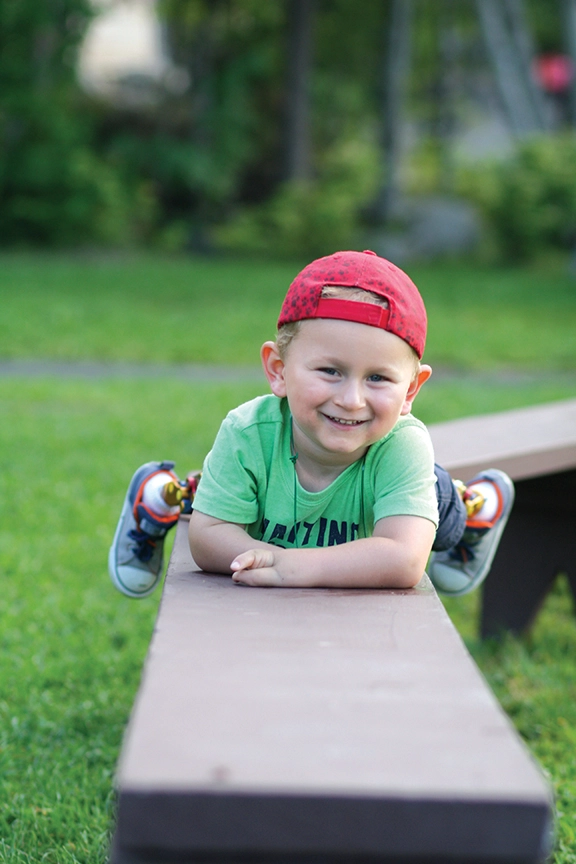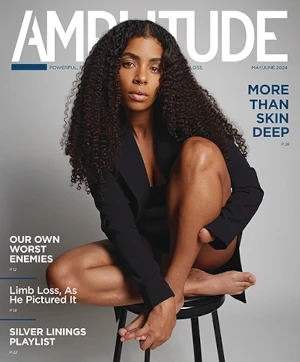Camps Offer Kids With Limb Loss a Positive Place to Grow

For many children, camp is a relaxing getaway and a place to have fun with friends. While campers with limb loss can relax and have fun with friends at nonspecialized camps, the depth of community and connection that leads to self-confidence is incomparable to a camp environment where all the kids share the common experience of having limb loss or limb difference.
Camp No Limits (CNL) is one such camp designed specifically for children with limb loss, and the personal growth and change experienced by the campers and their families is often described as life changing. In some cases, this is the only chance for these kids to hang out among peers who understand them and their struggles, or to be around adults who encourage them to push through mental and physical limitations to experience new activities and discover a sense of freedom.
CNL is unique from other camps in two ways. First, it offers ten camps throughout the year, and second, it’s a family camp, where some of the youngest campers are babies, and parents and siblings are invited to join. Each camp brings 30-50 families together with about 150-200 people per camp, and specialized programming is offered to everyone. “Each camp stands out in unique ways,” says Mary Leighton, OTR/L, CNL’s founder and executive director, who also serves as the camp’s head occupational therapist. “All of our camps foster greater bonds between other kids and families.”

Leighton has seen the positive effect of repeat camp attendance. “Attending more than one camp offers the opportunity to meet other campers and families from around the country,” she says. “Different activities are offered in different locations, so attending more than one camp also broadens campers’ skills and deepens their experience.”
CNL makes an effort to not only give the families a place to experience community and connection, but also to be a place that has a range of support personnel available to them. The camp counselors have a big impact on the kids’ experience, and they are all healthcare professionals, including physical and occupational therapists, prosthetists, consulting social workers, and psychologists. Additionally, adult amputee mentors have gone through mentorship training with either Hanger Clinic’s AMPOWER program or the Amputee Coalition’s peer visitor training program. Having experts available and actively participating allows campers the chance to bond with adult mentors and healthcare professionals who can provide a fun and educational environment, as well as one that is emotionally and physically safe.
One of the ways the camp empowers its families is by giving parents a place to be surprised by possibility when they may have previously only seen a life of limitation for their child. Parents can also see the latest prosthetic technology to learn what is physically possible for their children. Siblings, too, have the chance to grow through small group sessions and hanging out with kids like them.
Although the Maine camp where CNL began is still a favorite, each camp has its own special environment, and other locations are gaining in popularity for the unique programs they offer. In Florida, for instance, campers get to meet Winter, the dolphin who made news for thriving with a prosthetic tail after an injury. Camp sNOw Limits, which is conducted in partnership with Maine Adaptive Sports & Recreation, offers a chance to try skiing or snowboarding with adaptive equipment and trained professionals.

Before Lilly Biagini, a 6-year-old bilateral above-knee amputee, had her amputation surgery, she was in a wheelchair full time due to a congenital condition that fused bones in her legs, and she was missing bones as well. Only three weeks into using prosthetic legs, she and her mom, Jessica, had the opportunity to attend CNL where Lilly got to meet Katy Sullivan, a Paralympic track and field record holder who helped Lilly get her first pair of running blades. Now that she can run, Lilly has developed tremendous confidence. “Knowing that you have a team of people who listen and understand the challenges of wearing prostheses is what gets you through the difficult moments and onto the rest of your life,” says Jessica. “Making impossible into ‘I’m possible’ is what CNL has given Lilly.”
Like the Biaginis, many other families have benefited in numerous ways as a result of attending a camp designed for children with limb loss or limb difference. With several camps available around the country at different times of the year and with financial assistance available to cover some or all of the costs, the camp experience could offer a great opportunity for youths and their family members to have some fun, make some friends, and potentially change their lives.
CAMPS FOR CHILDREN WITH LIMB LOSS AND LIMB DIFFERENCE
Adventure Amputee Camp
www.adventureamputeecamp.org
Adventure Camp
www.adventurecampinc.org
Amputee Coalition Paddy Rossbach Youth Camp
www.amputee-coalition.org
Camp No Limb-itations
www.choa.org/campnolimbitations
Camp No Limits
www.nolimitsfoundation.org
Camp STAR, Youth Amputee Camp
www.chp.edu/campstar
Wounded Warrior Amputee Softball Team Kids Camp
www.woundedwarrioramputeesoftballteam.org/kids-camp



